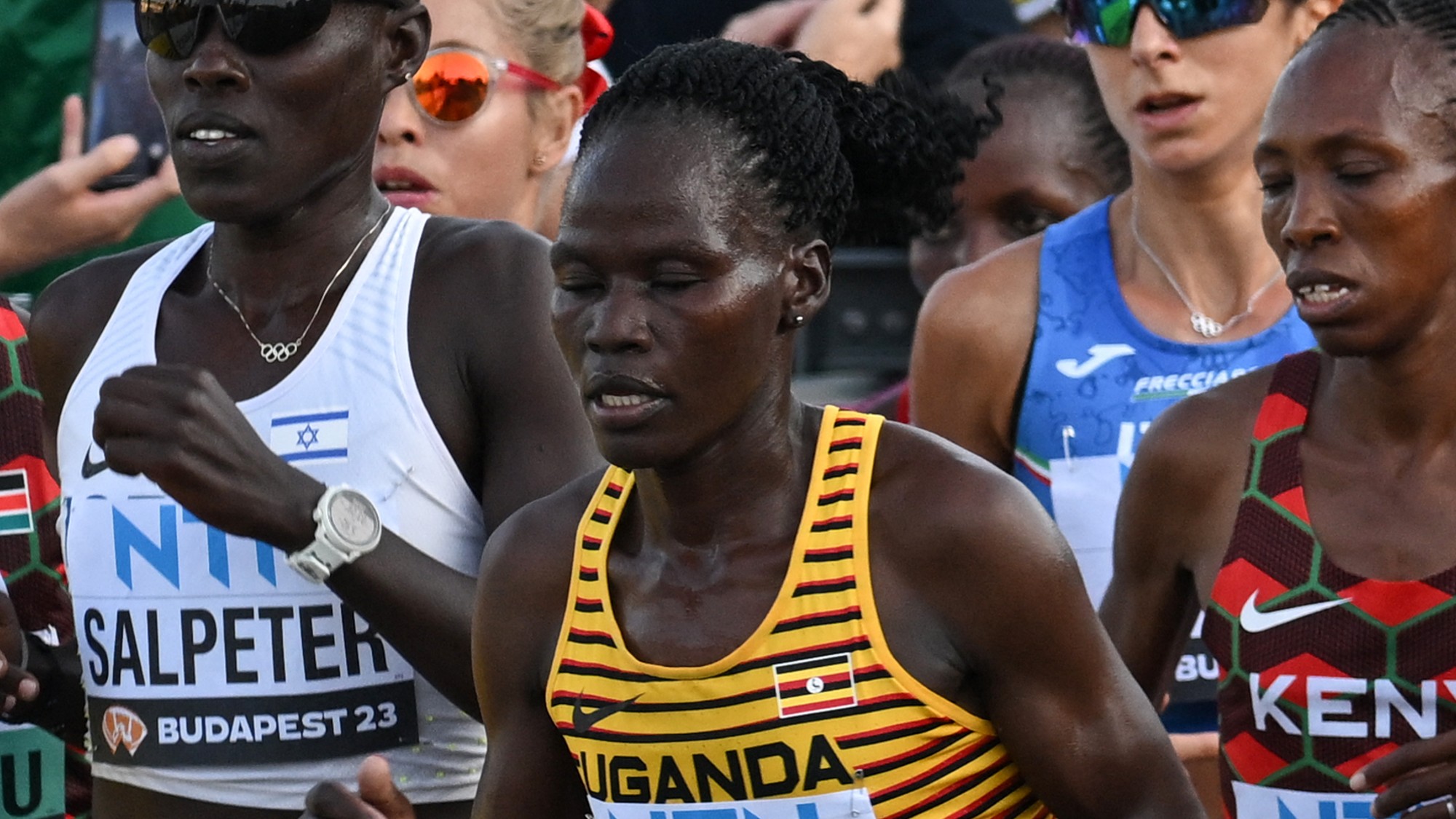Kenya's 'epidemic of violence' against female athletes
Murder of Olympic marathon runner Rebecca Cheptegei spotlights 'trend' of killings and wider culture of domestic abuse

A free daily email with the biggest news stories of the day – and the best features from TheWeek.com
You are now subscribed
Your newsletter sign-up was successful
The murder of a Ugandan marathon runner returning from the Paris Olympics has "highlighted a horrifying trend in Kenya", said The Sunday Times.
Rebecca Cheptegei, 33, died of burns last week in Eldoret, western Kenya. Dickson Ndiema, her ex-partner, had "poured petrol over her and set her alight" as she and her young daughters were collecting clothes from a washing line outside her home.
Ndiema was admitted to the same hospital after accidentally setting himself on fire, and has since died from his injuries. But killings of successful female athletes have become "a grimly familiar occurrence" in Kenya.
The Week
Escape your echo chamber. Get the facts behind the news, plus analysis from multiple perspectives.

Sign up for The Week's Free Newsletters
From our morning news briefing to a weekly Good News Newsletter, get the best of The Week delivered directly to your inbox.
From our morning news briefing to a weekly Good News Newsletter, get the best of The Week delivered directly to your inbox.
Prizewinners become prey
Cheptegei, who came 44th in last month's Paris Games and was Uganda's marathon record holder, had bought property and land in the Rift Valley. The region's high altitude and traditional running culture have "helped to produce an army of medal-winning long-distance runners", said the paper.
And women, whose role was "once limited to minding chickens and children", have emerged as "big local breadwinners". They have become "prey for unscrupulous suitors offering themselves as coaches, husbands or both".
"Women today dream of becoming top world athletes and they come home with a lot of money, while Kenyan men dream of exploiting them – they prey on them and their hard-won cash," said former professional runner and coach Godfrey Kiprotich. "It's becoming a norm now in Kenya and it must stop."
"This tragedy is a stark reminder that we must do more to combat gender-based violence in our society, which in recent years has reared its ugly head in elite sporting circles," said Kenya's minister of sport Kipchumba Murkomen.
A free daily email with the biggest news stories of the day – and the best features from TheWeek.com
Cheptegei is at least the third elite female athlete killed by a male partner or ex-partner in Kenya since 2021, in what advocates describe as an "epidemic of gender-based violence", said CBC.
Agnes Tirop, a 25-year-old Olympic runner and two-time world championship bronze medalist, was stabbed to death in her home in Iten, Kenya, in 2021. Her husband Ibrahim Rotich was charged with her murder and has pleaded not guilty. He was released on bail last year and is still awaiting trial.
The night before, 27-year-old runner Edith Muthoni was murdered with a machete in Nairobi, and her boyfriend was detained. The following year, Kenyan-born runner Damaris Mutua, 28, who had signed a contract to run for Bahrain, was found strangled in her home in Iten. Her boyfriend, Ethiopian runner Koki Fai, fled and is still wanted for her murder.
"We are failing our women," said Zaina Kombo of Amnesty International Kenya.
Kenya's 'epidemic of femicide'
In Kenya, violence against women extends far beyond the athletic community. This year, thousands of women in cities all over Kenya took part in protests against the "epidemic of femicide", after a series of gruesome murders.
More than 500 cases of femicide were recorded in Kenya between 2016 and 2023, according to Amnesty International, particularly during and since the Covid-19 pandemic. Femicide Count Kenya recorded 152 killings in 2023: the highest since the organisation began tracking femicide in 2018, although the organisation regularly stresses that the true number is likely to be higher.
At least one in three Kenyan women aged 15-49 have suffered physical violence in their lives, according to government data from 2022. For married women, the number was even higher.
Nearly two-thirds of Kenya's female victims are killed by their partners or ex-partners, according to Africa Data Hub, which looked into the deaths of 546 women between 2016 and 2023.
Local rights groups have called on the government to declare femicide a national emergency and define it as a unique crime, distinct from murder, said the BBC. Despite Kenya's already "robust laws against gender-based violence, most perpetrators go unpunished". But commentators in Kenya's "manosphere" have been blaming murdered women for their deaths on social media.
Politicians have also been accused of victim-blaming. Senator Tabitha Mutinda "ignited rage" in February when she suggested that young women were being killed due to an obsession with money and expensive lifestyles, said openDemocracy.
"It's very sad that one of our women leaders has no inkling of what the real issue is or the root cause of violence against women and girls," said Audrey Mugeni, co-founder of Femicide Count Kenya. "She can't lead us with an attitude that enables misogyny and power imbalances."
Harriet Marsden is a senior staff writer and podcast panellist for The Week, covering world news and writing the weekly Global Digest newsletter. Before joining the site in 2023, she was a freelance journalist for seven years, working for The Guardian, The Times and The Independent among others, and regularly appearing on radio shows. In 2021, she was awarded the “journalist-at-large” fellowship by the Local Trust charity, and spent a year travelling independently to some of England’s most deprived areas to write about community activism. She has a master’s in international journalism from City University, and has also worked in Bolivia, Colombia and Spain.
-
 Local elections 2026: where are they and who is expected to win?
Local elections 2026: where are they and who is expected to win?The Explainer Labour is braced for heavy losses and U-turn on postponing some council elections hasn’t helped the party’s prospects
-
 6 of the world’s most accessible destinations
6 of the world’s most accessible destinationsThe Week Recommends Experience all of Berlin, Singapore and Sydney
-
 How the FCC’s ‘equal time’ rule works
How the FCC’s ‘equal time’ rule worksIn the Spotlight The law is at the heart of the Colbert-CBS conflict
-
 Ex-Illinois deputy gets 20 years for Massey murder
Ex-Illinois deputy gets 20 years for Massey murderSpeed Read Sean Grayson was sentenced for the 2024 killing of Sonya Massey
-
 Why have homicide rates reportedly plummeted in the last year?
Why have homicide rates reportedly plummeted in the last year?Today’s Big Question There could be more to the story than politics
-
 How the Bondi massacre unfolded
How the Bondi massacre unfoldedIn Depth Deadly terrorist attack during Hanukkah celebration in Sydney prompts review of Australia’s gun control laws and reckoning over global rise in antisemitism
-
 Australian woman found guilty of mushroom murders
Australian woman found guilty of mushroom murdersspeed read Erin Patterson murdered three of her ex-husband's relatives by serving them toxic death cap mushrooms
-
 Crime: Why murder rates are plummeting
Crime: Why murder rates are plummetingFeature Despite public fears, murder rates have dropped nationwide for the third year in a row
-
 Kenya arrests alleged ant smugglers
Kenya arrests alleged ant smugglersspeed read Two young Belgians have been charged for attempting to smuggle ants out of the country to exotic pet buyers
-
 The missed opportunities to save Sara Sharif
The missed opportunities to save Sara SharifTalking Point After each horrific child abuse case, we hear that lessons will be learnt. What is still missing?
-
 Haitian gangs massacre hundreds accused of 'witchcraft'
Haitian gangs massacre hundreds accused of 'witchcraft'Under the Radar Vodou practices blamed for gang leader's son's illness, as elderly are hacked to death in Port au Prince